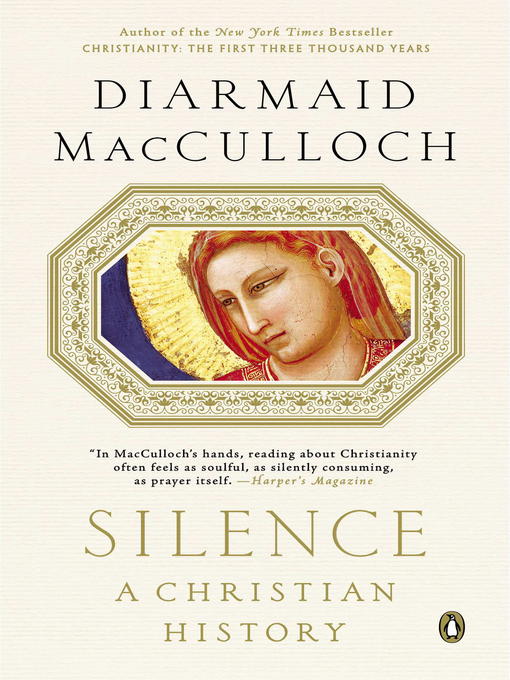
Silence
A Christian History
کتاب های مرتبط
- اطلاعات
- نقد و بررسی
- دیدگاه کاربران
نقد و بررسی

Starred review from July 8, 2013
Throughout the history of Christianity, silence has been as much a path toward human knowing of God as have vocal proclamations about God. Yet, as acclaimed church historian MacCulloch (A History of Christianity: The First Three Thousand Years) points out in this stimulating and sweeping overview, the Christian church encourages silence as a useful theological method while also remaining silent in the face of evils that have devastated individuals and cultures. MacCulloch traces the religious emphasis on silence to pre-Christian times, discovering the impulse toward silence that Christianity adopted, then follows it through the New Testament and the early Church thinkers, and on through the iconoclastic reforms of the early eighth century and the much later Protestant reforms that often pitted word against silence. The author then turns to the grave and harmful silences in which the Church has been in varying ways complicit, such as clerical child abuse, the Holocaust, and slavery. MacCulloch persuasively shows how the Church has constructed and reconstructed silence in ways that many Christian thinkers would neither have expected nor embraced. Agent: Felicity Bryan, Felicity Bryan Associates.

July 15, 2013
MacCulloch (History of the Church/Oxford Univ.; Christianity: The First Three Thousand Years, 2011, etc.) takes on the difficult task of discovering the history of silence in the Christian faith. The author takes an unusual approach to his topic, allowing it a wide array of definitions and also plumbing both history and the absence of history in crafting his work. He begins as any scholar of the New Testament should, with the Old Testament, and concludes that, overall, the Hebrew Scriptures are not overt advocates of silence. Nevertheless, the religion of Christianity would indeed find great meaning in silence from the very beginning, even in Jesus' refusal to proclaim his identity with openness or to argue with his accusers before the cross. Silence found its chief expression in the early church through contemplative worship, namely in monasticism. Here, MacCulloch provides an interesting history of the ups and downs of silence in monasticism for the many centuries leading to and through the "three reformations" (iconoclasm, papal reforms and the Protestant Reformation). Quiet medieval Catholicism contrasts tremendously with the noise and din of Protestantism, a wellspring of preaching and music. Yet with Protestantism firmly in place, the author finds yet another type of silence to catalog: silence for the sake of survival. Under this heading, the author examines closet Christian sects and peoples forced into silence in order to survive. Finally, he examines history forgotten and turned into silence, from the forgotten roles of women to clerical sex abuse. MacCulloch covers some intriguing historical ground and raises many points of reflection for Christians. However, he fails to produce a cohesive and convincing history of silence. Discussing everything from strict monastic orders to the rewriting of Holocaust history as being about "silence" stretches the term to a state of near-meaninglessness. MacCulloch has bitten off more than most readers will want to chew.
COPYRIGHT(2013) Kirkus Reviews, ALL RIGHTS RESERVED.

November 1, 2013
Based on six 2012 Gifford Lectures at the University of Edinburgh, MacCulloch (history of the church, St. Cross Coll., Univ. of Oxford; Christianity: The First Three Thousand Years) presents a sweeping overview of silence as a theme occurring throughout Christianity. Silence and religion enjoy an increasing body of literature, as the nearly 600 citations here indicate. The author begins with silence seen in the Tanakh (Old Testament) and traces it through monasticism, the Reformation and Counter-Reformation, and to later times, where he emphasizes its negative use as means of concealment in anti-Semitism, slavery, gender issues, and clergy abuse. While the work emphasizes history, particularly in the West, rather than deeper examination of silence in prayer experience, as offered in Martin Laird's A Sunlit Absence: Silence, Awareness, and Contemplation, it presents fairly such mystics as St. John of the Cross and Teresa of Avila, though slips occur--Catherine of Siena was neither wife nor mother. MacCulloch's very personal viewpoint reflects his perspective as a former ordained deacon in the Church of England; he now describes himself as a "candid friend of Christianity." VERDICT Intelligent and thought-provoking, this title is recommended for readers wishing broader historical context on the subject.--Anna Donnelly, St. Johns. Univ., Jamaica, NY
Copyright 2013 Library Journal, LLC Used with permission.

























دیدگاه کاربران